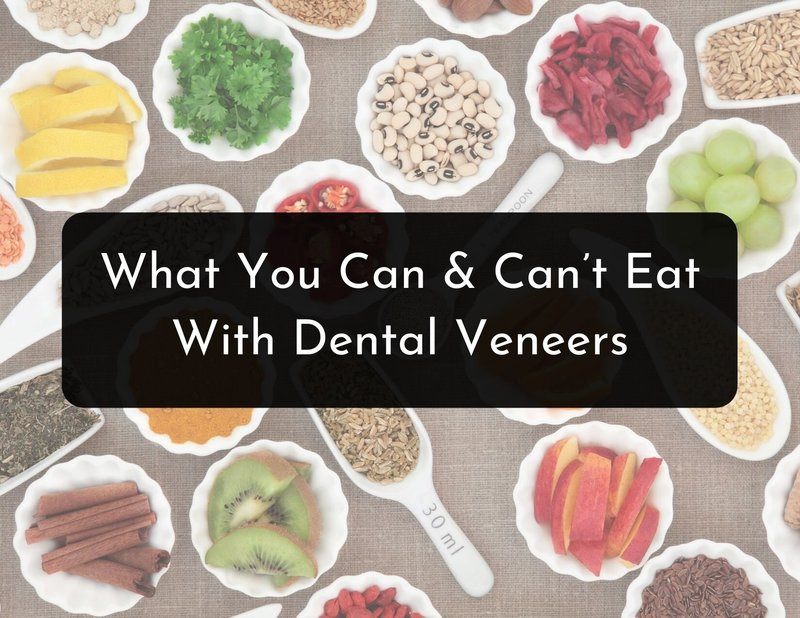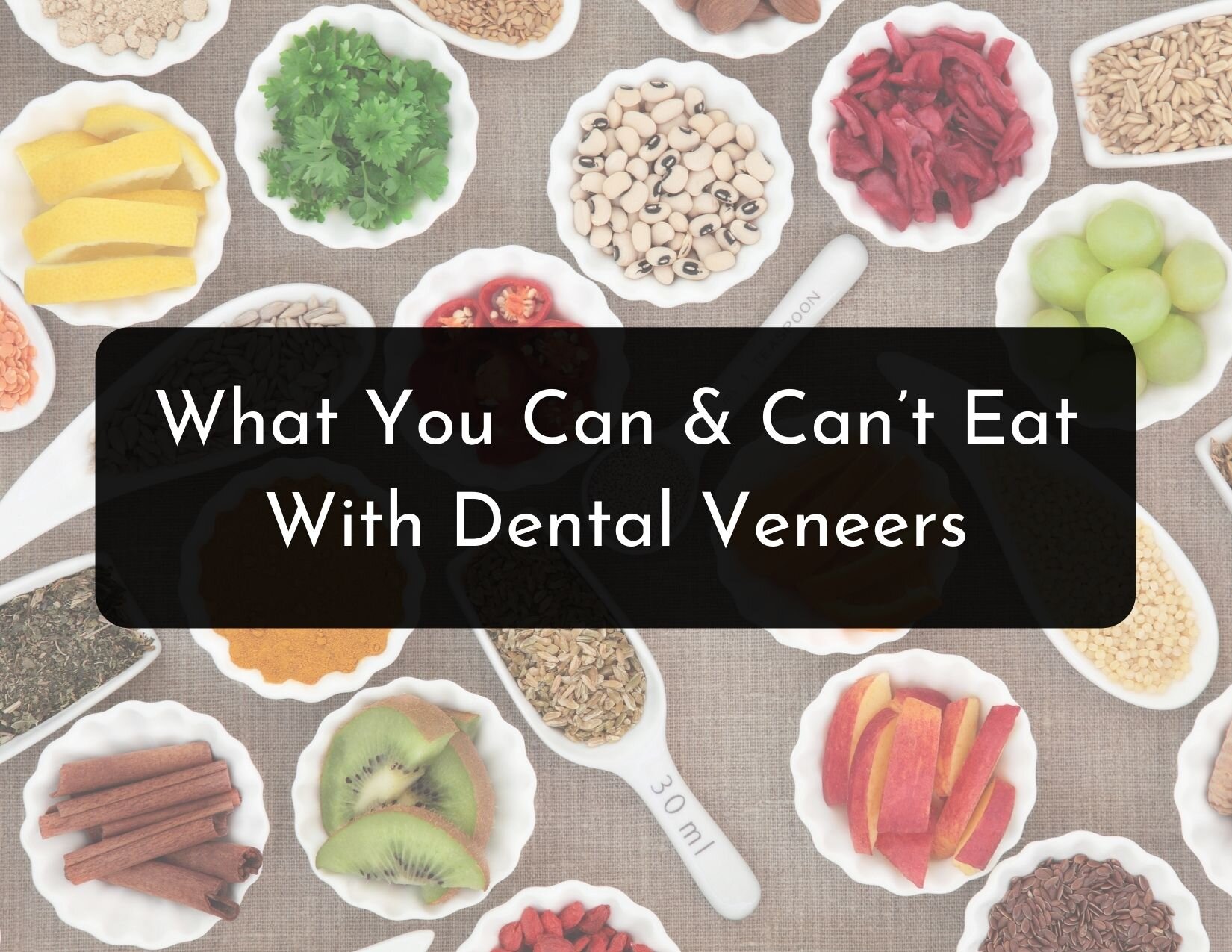
Dental veneers, made of porcelain or resin, enhance smile appearance. They allow for normal eating habits, but caution is advised. Can we eat with dental veneers? Avoid hard or sticky foods to prevent damage. Foods prone to staining should be consumed carefully. Good oral hygiene and regular check-ups ensure veneers’ longevity

Can You Eat With Dental Veneers?
Dental veneers are a popular cosmetic dentistry option that can enhance the appearance of your smile. They are thin shells made of porcelain or composite resin that are bonded to the front surface of your teeth. Veneers can correct various dental imperfections, such as discoloration, chips, and gaps. However, many people wonder if they can eat normally with dental veneers. In this article, we will explore whether you can eat with dental veneers and provide some helpful information on this topic.
Understanding Dental Veneers
Dental veneers are designed to be durable and long-lasting. They are custom-made to fit your teeth and are bonded using a strong adhesive. Veneers are known for their ability to withstand normal biting and chewing forces. However, it’s important to remember that while veneers are strong, they are not indestructible. Like natural teeth, veneers can be damaged by excessive force or trauma.
Eating with Dental Veneers
When it comes to eating with dental veneers, you can generally enjoy a wide range of foods. Veneers are designed to function like natural teeth, allowing you to bite and chew most foods without any issues. However, it’s important to be mindful of certain foods and habits that can potentially damage your veneers.
What to Avoid
While dental veneers are strong, they can still be susceptible to damage if not properly cared for. It’s important to avoid biting into hard objects, such as ice, hard candies, or pens, as this can cause your veneers to chip or crack. Additionally, avoid using your teeth as tools to open packaging or bite into tough foods. These habits can put excessive pressure on your veneers and may lead to damage.
Benefits of Dental Veneers
Despite the need for some caution, dental veneers offer numerous benefits. One of the main advantages is their ability to transform your smile. Veneers can improve the color, shape, and alignment of your teeth, giving you a beautiful and confident smile. They are also stain-resistant, so you can enjoy your favorite foods and beverages without worrying about discoloration. Additionally, veneers are a minimally invasive treatment option compared to other dental procedures, such as crowns or orthodontics.
Proper Care for Dental Veneers
To ensure the longevity of your dental veneers, it’s essential to practice good oral hygiene. Brush your teeth twice a day with a non-abrasive toothpaste and floss daily. Regular dental check-ups are also important to monitor the condition of your veneers and address any issues early on. If you participate in activities that could potentially damage your veneers, such as contact sports, it’s advisable to wear a mouthguard for protection.
Conclusion
In conclusion, while dental veneers are durable and allow you to eat with ease, it’s important to exercise caution and avoid habits that could potentially damage them. By practicing proper care and maintaining good oral hygiene, you can enjoy the benefits of dental veneers for many years to come. Remember to consult with your dentist for personalized advice and guidance on maintaining your dental veneers.
Key Takeaways: Can You Eat With Dental Veneers?
- Dental veneers are a thin covering placed over the front of your teeth to improve their appearance.
- While dental veneers are strong and durable, it’s important to be careful when eating certain foods.
- Avoid biting into hard foods like ice or using your teeth to open packages, as this can damage your veneers.
- Sticky or chewy foods like caramels or taffy can also pose a risk to your veneers, so it’s best to avoid them.
- Focus on eating a balanced diet with soft foods, such as cooked vegetables, lean meats, and pasta, to protect your veneers.
Frequently Asked Questions
Can I eat normally with dental veneers?
Yes, you can eat normally with dental veneers. Veneers are designed to be strong and durable, allowing you to enjoy a wide range of foods without any issues. However, it’s important to remember that veneers are not indestructible, so it’s best to avoid biting down on hard objects like ice or using your teeth as tools.
In addition, it’s a good idea to be mindful of certain foods that could potentially stain or damage your veneers. For example, highly pigmented foods and beverages like coffee, tea, and red wine can cause staining over time. It’s best to consume these in moderation and rinse your mouth with water afterwards to minimize any potential discoloration.
Do dental veneers affect my ability to chew?
No, dental veneers should not affect your ability to chew. Veneers are custom-made to fit your teeth and are bonded securely in place, allowing for normal functionality. They are designed to mimic the natural structure and shape of your teeth, so you should be able to chew and bite down comfortably.
If you experience any discomfort or difficulty when chewing with your veneers, it’s important to consult your dentist. They can assess the situation and make any necessary adjustments to ensure proper fit and functionality.
Are there any food restrictions with dental veneers?
There are generally no specific food restrictions with dental veneers. As mentioned earlier, veneers are durable and can withstand normal biting and chewing forces. However, it’s always a good idea to use caution when consuming certain foods that may pose a higher risk of damage or staining.
For example, extremely hard or sticky foods like hard candies, popcorn kernels, or taffy can potentially chip or dislodge your veneers. It’s best to avoid biting down on these types of foods to prevent any accidents or damage. Additionally, it’s recommended to practice good oral hygiene and maintain regular dental check-ups to ensure the longevity of your veneers.
Can I eat hot or cold foods with dental veneers?
Yes, you can eat hot or cold foods with dental veneers. Veneers are made from materials that are resistant to temperature changes, so you should not experience any sensitivity or discomfort when consuming hot or cold foods and beverages.
However, it’s important to note that if you have any pre-existing sensitivity or discomfort with your natural teeth, veneers may not completely eliminate these issues. It’s always best to consult with your dentist if you have concerns about temperature sensitivity.
How should I care for my dental veneers when it comes to eating?
Caring for your dental veneers when it comes to eating is relatively simple. It’s important to maintain good oral hygiene practices, including brushing and flossing regularly. Use a non-abrasive toothpaste and a soft-bristled toothbrush to avoid scratching or damaging the surface of your veneers.
In addition, it’s recommended to avoid excessive force or pressure when biting down on hard foods. While veneers are designed to be durable, they are not indestructible. Be mindful of what you eat and try to avoid any habits that may increase the risk of damage, such as biting on pen caps or using your teeth to open packages.
Can I eat and drink as I normally would with Porcelain Veneers?
Final Thoughts: Can You Eat With Dental Veneers?
Call or Book appointment online
:Ace Dental Care Alpharetta office: 678-562-1555 - Book Now
Ace Dental Care Norcross office: 770-806-1255 - Book Now
Disclaimer
This blog post was generated by artificial intelligence. The content of this post may not be accurate or complete, and should not be relied upon as a substitute for professional advice. If you have any questions about the content of this post, please contact us.
We are constantly working to improve the accuracy and quality of our AI-generated content. However, there may still be errors or inaccuracies. We apologize for any inconvenience this may cause.





